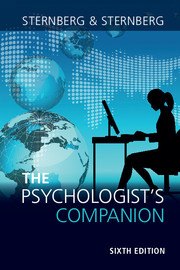 The Psychologist's Companion
The Psychologist's Companion Book contents
- Frontmatter
- Contents
- Preface
- Acknowledgments
- Introduction
- Part I Macro-Challenges in Writing Papers: Planning and Formulating Papers
- Part II Micro-Challenges in Writing Papers: Presenting Your Ideas in Writing
- Part III Writing and Preparing Articles for Journal Submission
- Part IV Presenting Yourself to Others
- 15 Preparing a Poster Presentation
- 16 Writing a Grant or Contract Proposal
- 17 How to Find a Book Publisher
- 18 Writing a Lecture
- 19 Doing a Job Interview
- 20 Doing Media Interviews
- Epilogue
- References
- Index
18 - Writing a Lecture
from Part IV - Presenting Yourself to Others
Published online by Cambridge University Press: 24 November 2016
- Frontmatter
- Contents
- Preface
- Acknowledgments
- Introduction
- Part I Macro-Challenges in Writing Papers: Planning and Formulating Papers
- Part II Micro-Challenges in Writing Papers: Presenting Your Ideas in Writing
- Part III Writing and Preparing Articles for Journal Submission
- Part IV Presenting Yourself to Others
- 15 Preparing a Poster Presentation
- 16 Writing a Grant or Contract Proposal
- 17 How to Find a Book Publisher
- 18 Writing a Lecture
- 19 Doing a Job Interview
- 20 Doing Media Interviews
- Epilogue
- References
- Index
Summary
Lecturing is one of the most important parts of being a psychologist. All of us have attended countless lectures and know what a difference it makes to listen to someone exciting versus someone dull. Sometimes you may not have any choice in terms of the material you present. But there are 20 keys that everyone can follow to write and deliver better lectures:
1. Do not read your lecture from a script.
2. Start off on an exciting note.
3. Organize and emphasize.
4. Say what you are going to say, say it, and say what you have said.
5. Use concrete examples.
6. Do not cram.
7. Be enthusiastic.
8. Make it relevant.
9. Know your audience.
10. Vary your pace and the kinds of content you present during the course of the lecture.
11. Pace yourself.
12. Do not be condescending.
13. Do not be defensive.
14. Do not wing it.
15. Be confident.
16. Tell a story.
17. Realize your purpose is to persuade as well as to inform.
18. Be careful with jokes, especially inside jokes.
19. End with a bang, not a whimper.
20. Keep audience participation under control.
1. Do not read your lecture from a script.
Listening to a lecture that is read directly from text is one of the more boring experiences known to humankind. Written language does not sound like oral language. If you ever read the transcript of a good talk, you will find it hard to comprehend. It should be! People just do not talk the way they read. When you hear a talk that is read word for word, the talk sounds unnatural. It is also boring to hear. Therefore, when you write a lecture, you are best off doing it in outline form or in some other form that will enable you to talk directly to the audience rather than reading the lecture.
Experience Is the Best Teacher
If you read an exact transcript of what you say in a conversation, or in a lecture, for that matter, you will find that the text is hard to understand and sometimes is incomprehensible in written form. Yet it may have been fully understandable in oral form. Unfortunately, the reverse also holds.
- Type
- Chapter
- Information
- The Psychologist's CompanionA Guide to Professional Success for Students, Teachers, and Researchers, pp. 330 - 337Publisher: Cambridge University PressPrint publication year: 2016


